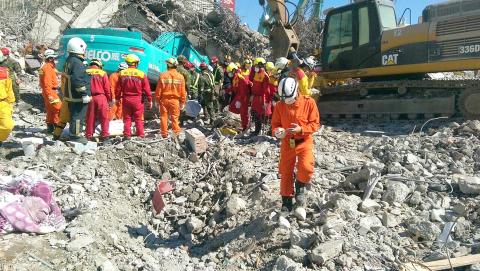Tainan Mayor William Lai (賴清德) at 4:20pm yesterday announced that the search-and-rescue operation at the Weiguan Jinlong complex in Tainan, which collapsed in an earthquake on Feb. 6, has come to an end, after the body of the last missing resident was found.
According to Central Emergency Operations Center statistics, the death toll from the magnitude 6.4 earthquake yesterday rose to a total of 116, of which 114 occurred at the Weiguan Jinlong complex, with one person who lived near the complex still missing.
The last body, which was recovered at 3:57pm yesterday, was the building’s management committee chairman, Hsieh Chen-Yu (謝鎮宇), who lived in building G, Lai said.

Photo: Hung Mei-hsiu, Taipei Times
Tainan Deputy Mayor Tseng Hsu-cheng (曾旭正) said the only person still missing after the earthquake is a woman surnamed Lin (林), who lived near the Weiguan Jinlong complex and had a habit of going out to exercise early every morning. Lin’s family has been unable to contact her since the earthquake.
The use of heavy equipment to break up and clear away rubble from the site was authorized in the hope of rescuing everyone as soon as possible, Lai said, adding that experience gained from the recovery work could be used as a reference by the National Fire Administration when considering rescue procedures in the future.
If rescue workers can use heavy equipment to retrieve bodies intact from the rubble, it means that such equipment could also be used to accelerate the search for survivors in sections that search-and-rescue personnel would not be able to reach by themselves, he said.
Even though heavy equipment was ready for use 36 hours after the earthquake, authorities were required to follow regulations and could only allow their use 62 hours after the event, which created a dilemma, Lai said.
The Construction and Planning Administration said it would expand a two-year-old-building examination project, increasing the number of buildings that are to receive subsidies of NT$8,000 for surveys and improvements this year from 500 to 2,000.
Priority is to be given to buildings in the six special municipalities and southern counties, with an emphasis to be placed on ensuring the structural safety of buildings, the administration said, adding that applications for the subsidy might begin as soon as next month.
The project, which is to examine the ability of private buildings to resist earthquakes and provide a subsidy for improvement measures, was planned in July last year, administration Director Hsu Wen-lung (許文龍) said, adding that because of the earthquake, the agency has decided to expand its scale to 2,000 buildings.
Preliminary evaluations are to include checking for cracks on buildings’ beams and pillars and peeling on exterior walls, Hsu said.
Due to southern residents’ concerns about the structural safety of buildings they live in after the earthquake, the administration is to subsidize buildings in southern Taiwan first, he added.

The CIA has a message for Chinese government officials worried about their place in Chinese President Xi Jinping’s (習近平) government: Come work with us. The agency released two Mandarin-language videos on social media on Thursday inviting disgruntled officials to contact the CIA. The recruitment videos posted on YouTube and X racked up more than 5 million views combined in their first day. The outreach comes as CIA Director John Ratcliffe has vowed to boost the agency’s use of intelligence from human sources and its focus on China, which has recently targeted US officials with its own espionage operations. The videos are “aimed at

STEADFAST FRIEND: The bills encourage increased Taiwan-US engagement and address China’s distortion of UN Resolution 2758 to isolate Taiwan internationally The Presidential Office yesterday thanked the US House of Representatives for unanimously passing two Taiwan-related bills highlighting its solid support for Taiwan’s democracy and global participation, and for deepening bilateral relations. One of the bills, the Taiwan Assurance Implementation Act, requires the US Department of State to periodically review its guidelines for engagement with Taiwan, and report to the US Congress on the guidelines and plans to lift self-imposed limitations on US-Taiwan engagement. The other bill is the Taiwan International Solidarity Act, which clarifies that UN Resolution 2758 does not address the issue of the representation of Taiwan or its people in

US Indo-Pacific Commander Admiral Samuel Paparo on Friday expressed concern over the rate at which China is diversifying its military exercises, the Financial Times (FT) reported on Saturday. “The rates of change on the depth and breadth of their exercises is the one non-linear effect that I’ve seen in the last year that wakes me up at night or keeps me up at night,” Paparo was quoted by FT as saying while attending the annual Sedona Forum at the McCain Institute in Arizona. Paparo also expressed concern over the speed with which China was expanding its military. While the US

SHIFT: Taiwan’s better-than-expected first-quarter GDP and signs of weakness in the US have driven global capital back to emerging markets, the central bank head said The central bank yesterday blamed market speculation for the steep rise in the local currency, and urged exporters and financial institutions to stay calm and stop panic sell-offs to avoid hurting their own profitability. The nation’s top monetary policymaker said that it would step in, if necessary, to maintain order and stability in the foreign exchange market. The remarks came as the NT dollar yesterday closed up NT$0.919 to NT$30.145 against the US dollar in Taipei trading, after rising as high as NT$29.59 in intraday trading. The local currency has surged 5.85 percent against the greenback over the past two sessions, central